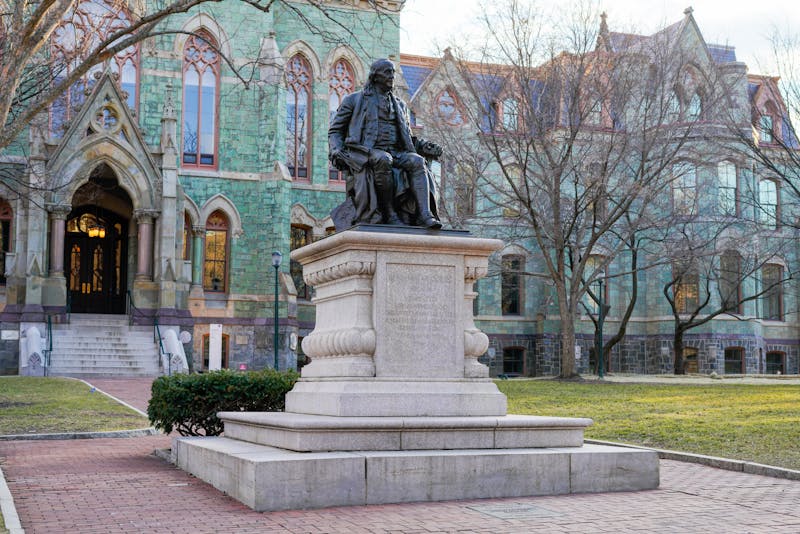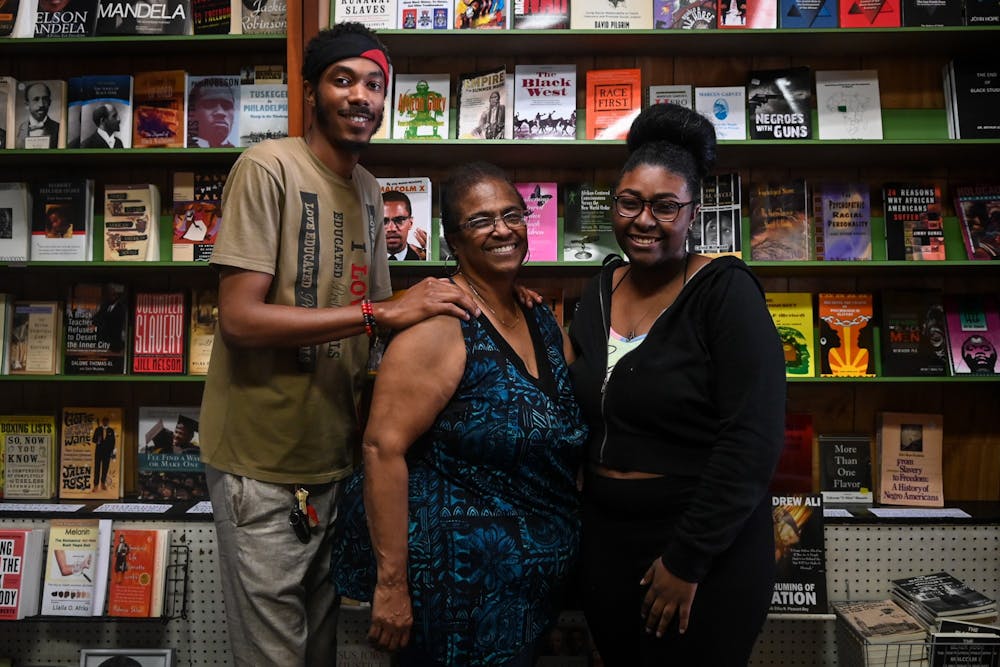
Chris Arnold (left), Dawud Hakim's daughter and the bookstore's current owner Yvonne Blake (center), and Hakim's great-granddaughter Alanna Ramberan (right)
Credit: Kylie CooperBlack business owners on campus and around the city — ranging from a 10-year-old with a lemonade stand to a local Philadelphian who owns the oldest Black-owned bookstore in Philadelphia — reflect on the creation of their businesses and their experiences as entrepreneurs.
In honor of Black History Month, The Daily Pennsylvanian interviewed several Black business owners who shared the challenges they faced as Black entrepreneurs — and the perseverance behind their journeys.
Micah Harrigan: Owner of Micah Mixx’s
Ten-year-old Micah Harrigan's age did not stop him from opening up his lemonade business, Micah's Mixx.
When he was 8 years old, Harrigan told his mother that he wanted to start his own business. After getting advice from family friends to pursue something he liked, Harrigan soon decided to launch his own lemonade stand.
Witnessing the business grow has been his favorite aspect of being an entrepreneur, he said.
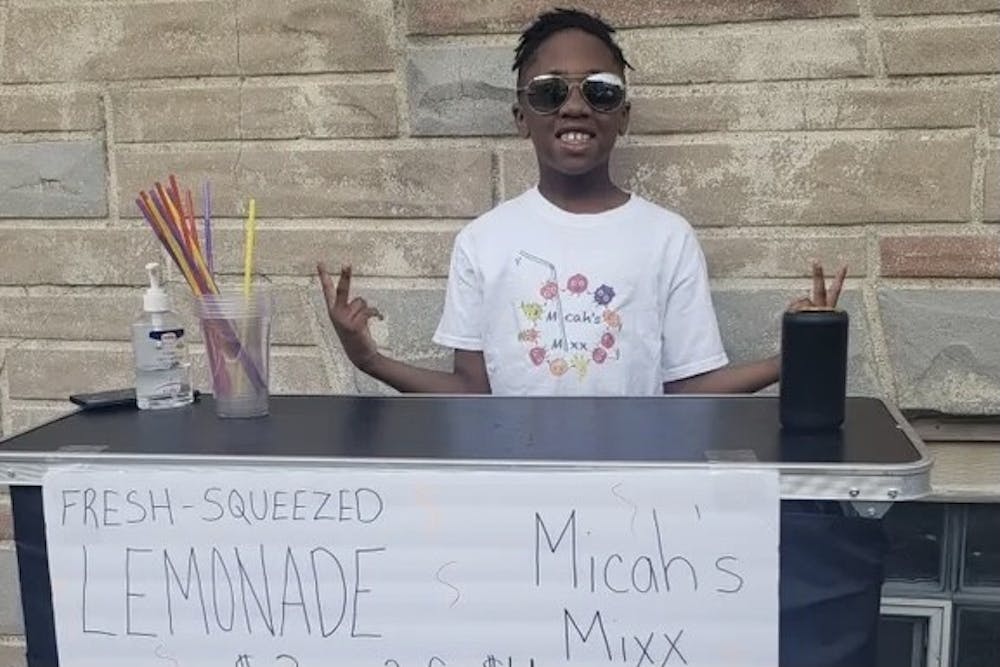
Micah Harrigan's opened up his lemonade business, Micah's Mixx at 8 years old. (Photo from Micahsmixx.com)
He started off selling lemonade outside of his house, and later shifted to hosting pop-ups at locations around Philadelphia and selling lemonade after-hours at one of OCF Coffee House's locations in the city. Harrigan returned to selling lemonade at his house due to COVID-19 in November, but ultimately decided to take a break due to a high abundance of orders.
“It has kind of been paused for the winter because things got big, but they got a little too big — to the point where the fridge was full of lemons," Harrigan said.
He plans to reopen the stand in the coming months, as he prepares a food truck that will allow him to sell lemonade at more locations around Philadelphia.
Deborah Olatunji: Penn student, author, and podcaster
Deborah Olatunji, a first year in the School of Nursing, has a book called "Unleashing Your Innovative Genius: High School Redesigned" and a podcast called "Voices of Disruption," which will be launching merchandise soon.
Through her book, Olatunji hopes to inspire students to see the education system as one that can be redesigned in order to fit the passions of each student, and as a place for students to connect beyond working solely on graded assignments. She added that students should have more control over their curriculums.
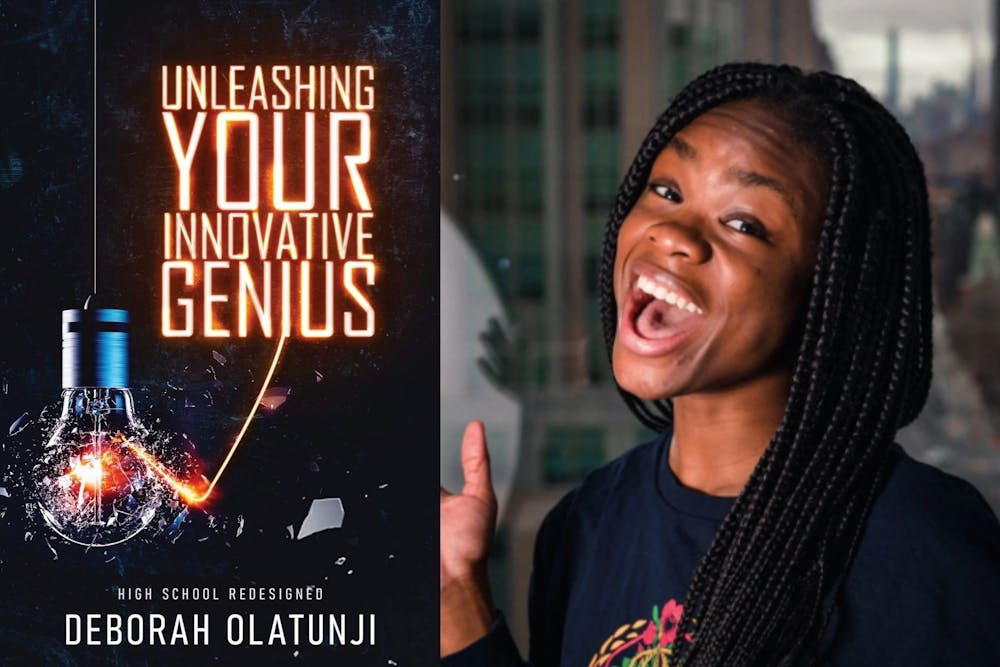
Deborah Olatunji, a first-year in the School of Nursing, is the author of the book, "Unleashing Your Innovative Genius: High School Redesigned" and a talk show host of the "Voices of Disruption" podcast. In her different projects, she aims to inspire others to step into their power, reflect on their experiences, and commit to a life filled with creativity and connection. (Photo from Deborah Olatunji)
“There is so much pressure to be perfect, and not enough room to explore,” Olatunji said.
Her favorite part about being an entrepreneur is the ability to create without any rules, adding that the job leads to self-growth and discovery.
“It is just a really, really fun way to learn about yourself and your community, and see where your creativity can reach higher heights," Olatunji said.
As a Black business owner, Olatunji stated that she initially faced difficulties when launching her book due to her lack of marketing experience. In addition to those difficulties, she stated that she often felt underestimated by others and that her thoughts on education were sometimes invalidated due to her young age.
Despite these difficulties, however, Olatunji hopes to continue exploring her passion for entrepreneurship.
“I think being an entrepreneur is a lifelong journey like being a creator,” Olatunji said. “It is not something you put on your resume as one and done. It is continuous work.”
She added that Black History Month is a period for Black youth to be celebrated for their surviving each day being Black in America.
"I think Black History means acknowledging your biases, acknowledging your privilege, and then doing the inner work to elevate and amplify Black voices,” Olatunji said.
April Burks and James Burks: Owners of The Pink Lapel
April and James Burks both own separate businesses — Pink Social Strategies and Common Ground Management, respectively — but together they own The Pink Lapel, an accessories company.
After making ties for her husband and his friends for a business event in 2014, April Burks said she was inspired to create The Pink Lapel. Since then, the couple has expanded the company to include female accessories and has showcased themed collections of the items.
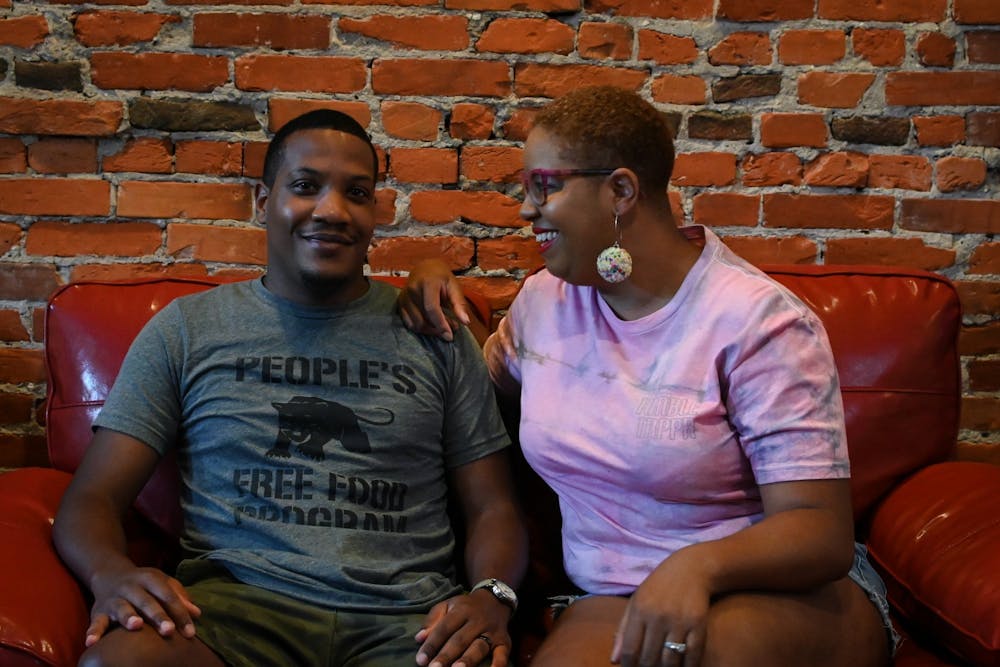
April (right) and James Burks (left) both own The Pink Lapel, an indies accessories company, which produces ties and female accessories.
“I want them to feel and be proud that a Black woman or a Black man helped make this,” April Burks said, adding that she now puts "a Black woman made this" on some of her products.
She said that their success carries a sense of accomplishment, adding that it is not easy for Black people to own businesses.
“At events during the year, sometimes we are the only Black vendors,” April Burks said.
She emphasized that Black people are often given less funding and do not come from backgrounds of generational wealth that could help them start their businesses, and that she was able to overcome these challenges with The Pink Lapel because she started off making ties out of inexpensive cotton.
Despite the challenges, April Burks said that she enjoys being a Black entrepreneur.
“In the last year, my favorite part about it is the pouring out of support from not only Black people but white allies after the Black Lives Matter Movement,” April Burks said.
James Burks added that he hopes that this "hype" over supporting Black-owned businesses does not end and return to the status quo.
“We don’t need you to support us. We need you to be able to shop with us outside of when your moral compass is telling you to do this or a marketing campaign that is happening for two months,” James Burks said.
Yvonne Blake, owner of Hakim’s Bookstore & Gift Shop
Dawud Hakim opened Hakim’s Bookstore & Gift Shop in the 1950s — the oldest Black-owned bookstore in Philadelphia — during the beginning of the civil rights movement, creating the store after realizing the lack of Black history within the American education curriculum.
His daughter, Yvonne Blake, now runs the store with her family in hopes of continuing Hakim's legacy of using books to educate people about Black History.
Blake stated that since the police killing of George Floyd, she has witnessed customers from a variety of racial backgrounds enter her store seeking knowledge on systemic racism and Black history. Although the regular flow of in-person customers stopped for three months during the pandemic, resulting in a switch to online sales, Blake stated that business has been busy as usual now that the store has reopened.
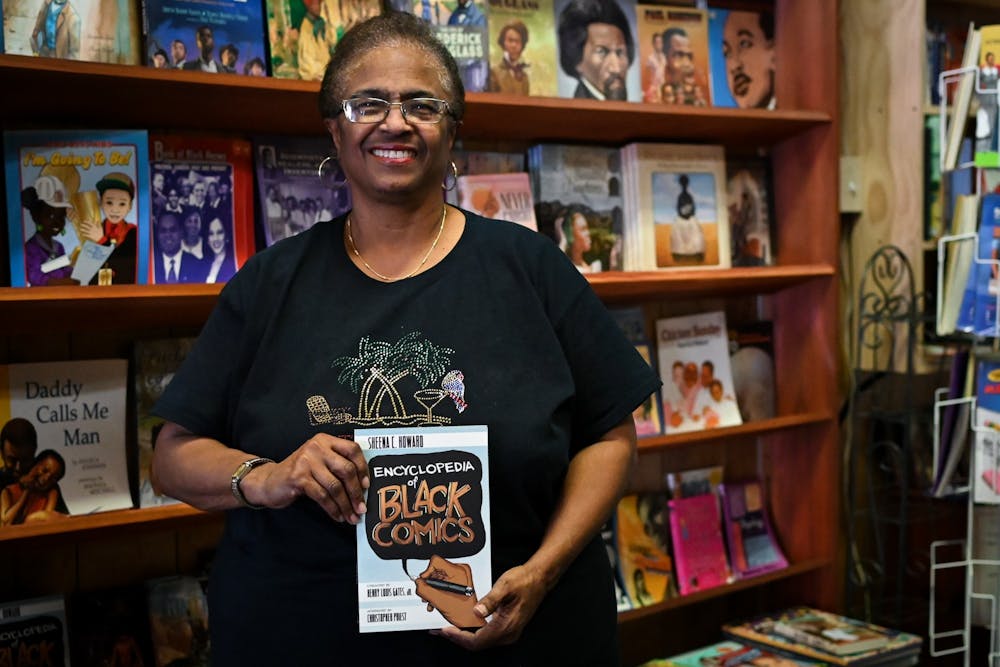
Yvonne Blake now runs Hakim’s Bookstore and Gifts—the first and oldest Black-owned bookstore in the east coast— which was founded by her father in the 1960s.
“My biggest pleasure is having people come into the store, see the books we have, and tell me that they didn't know that happened in history or they didn't know about that,” Blake said, adding that selling books on self-help and financial empowerment that were not available in the 1960s and 1970s gives her pleasure.
As Black entrepreneurs of a bookstore that sells books about the Black experience, Blake stated that both her and her father have experienced difficulties.
When the bookstore first opened, Blake said were times Blake remembers sitting outside because there were no customers interested in buying their books. Being the first Black bookstore owner in a Philadelphia, Hakim added that he faced difficulties which Blake said continues today.
“It is harder for African Americans to get banks to support them, to get loans,” Blake said, adding that places that would automatically support a white business hesitate to do the same for minorities.
Blake added that there are places now that can help one find the right resources to start a business, like The Enterprise Center, which she has used to help her bookstore.
“There are opportunities out there but we don't get the information that non-minority businesses get,” Blake said. “You have to kind of fight for it to get it."
Shawntay Harrigan: Owner of Triple S Hair Lounge
Empowered to establish a business that would allow her to make people feel good in their own skin, Shawntay Harrigan created Triple S Hair Lounge after being incarcerated at 21 years old.
“No matter how much they make, what their job title is, or what they do for a living, each and every person that walks through my door we treat like they are a celebrity walking down the street,” Harrigan said.
Her lounge's slogan is "Be bold, be daring, and be simply beautiful.'
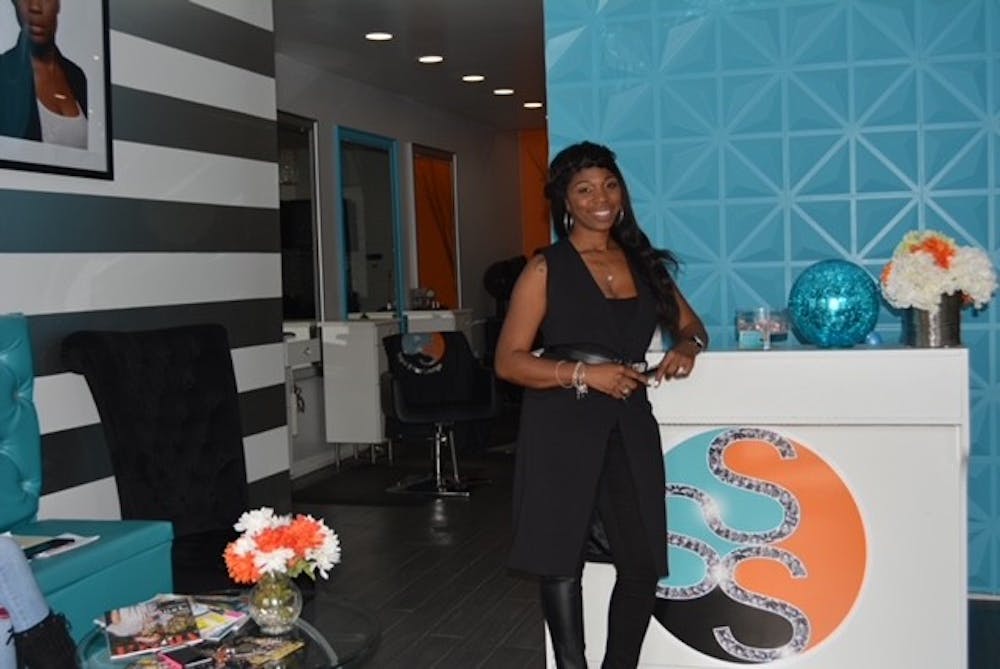
Shawntay Harrigan created Triple S Hair Lounge after being incarcerated at 21 years old. (Photo from TayRell Harrigan)
“My job and my duty is to not just have my own business, but to be a stepping stone for those that want to enter into the same field and learn the ins and outs of how to run a business properly,” Harrigan said, adding that she sees herself as a mentor for other young Black women.
Using her business to empower others to establish their own, she now teaches part time at the cosmetology school she graduated from, Empire Beauty School, and hires some of her students at her salon.
Although she stated that she gets a lot of joy out of running her business, she said that being a Black entrepreneur has had its difficulties.
“A lot of things that are provided to other nationalities are not provided to African Americans, and if so we are not aware of those things unless we reach out to certain selected people in order to figure those things out or find it out,” Harrigan stated.
Harrigan believes Black-owned businesses are important because they give Black people the opportunity to create the life they want, as they are able to control their salary. She added that to her, Black History Month means education about the Black community.
"It means the strongholds who are broken, you know, for us to be able to celebrate and be acknowledged for our accomplishments in our endeavors," Harrigan said.
Troy Harris and Kareem Wallace
After being furloughed by Bon Appétit Management Company, which employs retail dining workers at Penn, chefs Troy Harris and Kareem Wallace launched their Kosher food truck, Grassroots, in hopes of supporting West Philadelphia youth education and employment prospects.
Harris said they were inspired to create Grassroots after participating in the successful Justice on the Menu Campaign, a public campaign to give employees a better salary.
“If we did that and can change lives on campus, we can change lives doing it for ourselves and trying to help others off campus,” Wallace said.
Both Wallace and Harris stated that being a Black entrepreneur has been challenging. There are many Black workers on campus who have the ability to train people but would be overlooked due to being Black, Harris said.
Harris added that he will never give up on the business because he hopes to provide others in the urban community an opportunity to do anything other than "going to jail or going to your grave early."
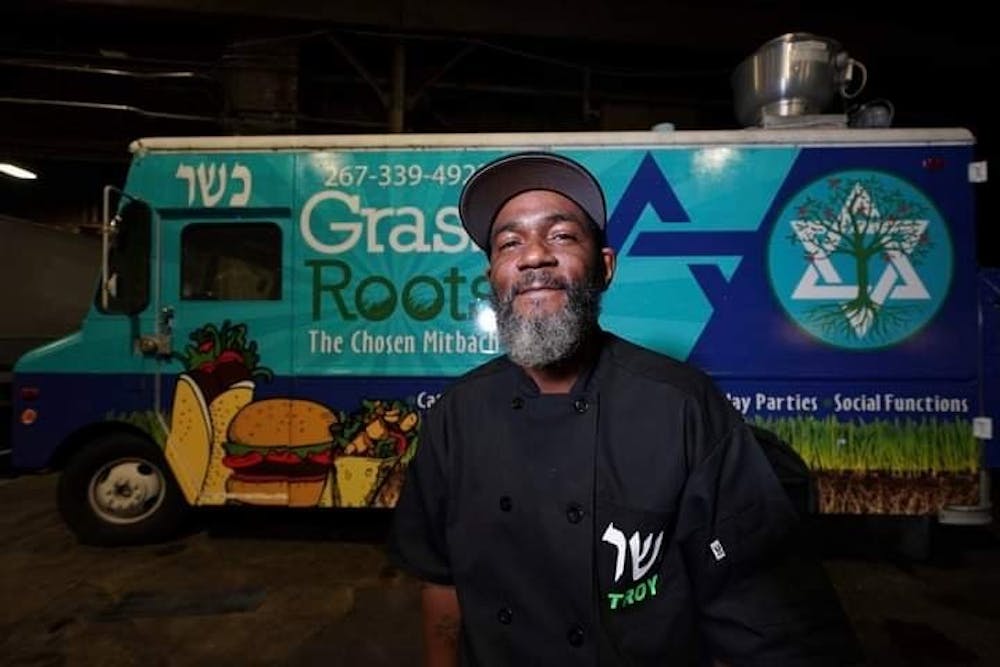
Chefs Troy Harris (pictured) and Kareem Wallace launched a Kosher food truck, Grassroots to support West Philadelphia youth education and employment prospects. (Photo from Troy Harris)
“That is why I got it in me cause I’ve been through a tragedy — my son was shot three years ago, and he is in a wheelchair now,” Harris stated. “This is more so of a heartfelt project to me.”
For Harris, Black History Month is a heavy topic, referencing how generations of his family have survived a history of racism.
“I just feel like there is just a lot behind it because I look at my mom, I look at my father, my grandmother and the cycle they went through with racism,” Harris said. “They didn't have a voice, and it is sad. So I feel like, for me, I stand up to anything that I feel like I've got to get off my chest, because I can't go through that stage again of being a gag order on your life, and you can't speak up as your right, for your rights.”
The Daily Pennsylvanian is an independent, student-run newspaper. Please consider making a donation to support the coverage that shapes the University. Your generosity ensures a future of strong journalism at Penn.
Donate






